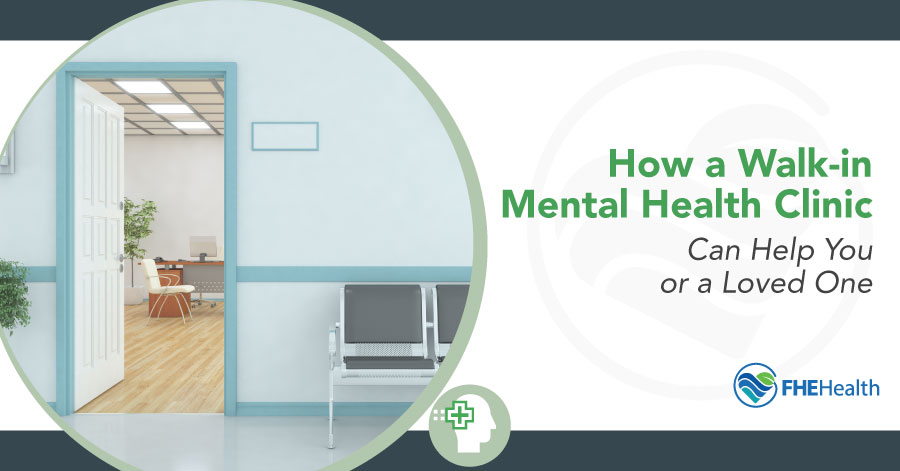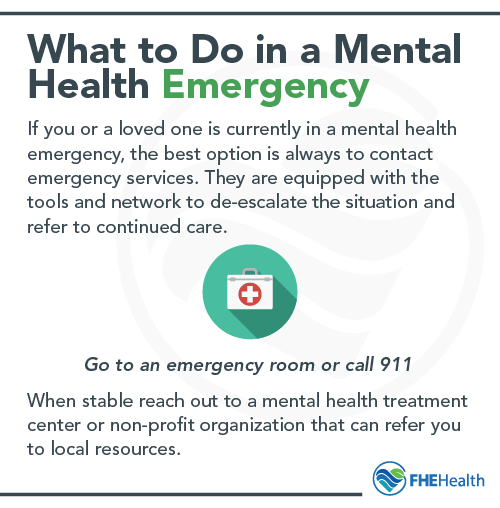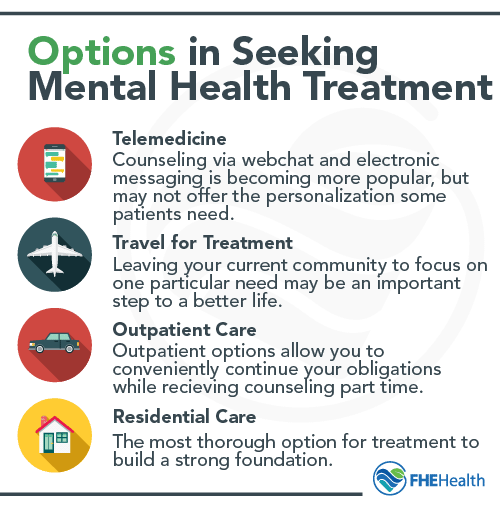
There’s an increasing demand for quick walk-in health care. If you don’t feel well for a day, you can head to your city’s express clinic, get some medical attention and go about your business.
Minute clinics, urgent care and telemedicine all provide quick medical care for those with colds, flu, injuries and minor illnesses. These medical facilities are designed to address your health care needs quickly. But what about when you’re having a mental health crisis? Mental health clinics and psychiatric urgent care centers are popping up across the country to offer immediate mental health services and walk-in therapy sessions for those in a mental health crisis.
In a Mental Health Emergency
 There are occasions where you simply need immediate mental health support. Perhaps your loved one is out of control and is now a danger to themselves. You may be dealing with a dire situation and feel so depressed that you’re thinking about suicide.
There are occasions where you simply need immediate mental health support. Perhaps your loved one is out of control and is now a danger to themselves. You may be dealing with a dire situation and feel so depressed that you’re thinking about suicide.
If you’re in this position, never wait for care. While you may be asking, “Where is there a walk-in mental health clinic near me,” you don’t need to turn to a specialized service.
In these urgent situations, your first step is to visit your local hospital emergency room. They have the necessary tools or are familiar with the local systems in place to protect you and provide you with the medical intervention needed to prevent a worsening outcome.
Once they stabilize the patient, these hospitals can help you find assistance for your specific needs. They have the tools to direct you to the next step.
What Qualifies as a Mental Health Crisis?
Individuals with established mental health conditions who are on the verge of a mental breakdown or who are having hallucinations, delusions or suicidal thoughts are experiencing a mental health crisis. Walk-in clinics can help stabilize these conditions and provide emergency care to prevent the situation from getting worse.
What Is an Urgent Mental Health Referral?
In some cases, an individual may receive care in a traditional hospital. A health professional in these facilities may make an open access mental health referral for crisis counseling. They can even schedule appointments for you and provide referrals to mental health clinics.
Are Mental Health Walk-In Clinics Available?
For many people, there is a growing level of accessible mental health care. Free walk-in mental health remains hard to locate, but some form of assistance may be available in your area now.
Consider Mental Health Clinics
 Walk-in mental health clinics and other in-community solutions are available in some regions of the country.
Walk-in mental health clinics and other in-community solutions are available in some regions of the country.
For example, a mental health clinic in a store such as Walmart lets people come in to talk about things such as the grief they are feeling or to learn more about why they feel so depressed.
Some programs are following the traditional urgent care model. Perhaps you can’t sleep at night due to anxiety or are struggling with a very low period in your life.
Mental health clinics let people walk in and get assistance quickly. However, this, again, is only meant to be a stopgap until additional help is available.
Another type of mental health walk-in service provides immediate care when a routine counselor or therapist isn’t available to the patient. For example, if someone seeing a therapist a few times a week needs support on the weekend, this model can offer a solution for getting that help without waiting.
Walk-in mental health clinics are valuable because of their accessibility. They can also help to reduce the stigma of going to see a therapist. These clinics aren’t long-term solutions or crisis intervention units, but they can open the door to mental health care and assist you with low-acuity needs, such as when you need help managing stress.
What Is a Crisis Stabilization Unit?
Crisis units are located in emergency rooms and other medical health centers. They provide fast support in a desperate situation. These crisis centers, whether they’re a component of a medical facility or a stand-alone unit, work to provide mental health support right away, helping an individual to get care immediately to prevent a condition from getting worse.
As noted, walking into any ER can offer this assistance. However, some hospitals and medical facilities have specially designed crisis stabilization units that can provide a better level of immediate help.
These centers typically have skilled mental health professionals available more readily than a typical ER may have. Walk-in crisis services may be best for those who have an established mental health problem, a high-risk of a mental breakdown, are a suicide risk or suffer from severe depression.
Online Therapists for Immediate Help
A mental health hotline is one way that people can reach out for help at home. Organizations have offered this type of care, a phone-call-away, for many years.
Over the last few years, though, online therapists have emerged to provide a new level of support through the internet and apps. Services like BetterHelp and Talkspace allow people to download an app, connect with a therapist and communicate instantly via text, chat or phone call.
This type of assistance has its place in the mental health care industry, but it’s not the ideal, long-term solution. It may also not provide the highest level of support for some patients, especially those who need residential care. This level of service won’t be able to prescribe you medication if needed and is likely not as thorough as a face-to-face session.
Yet, like walk-in clinics, it opens the door to the concept of mental health support. In that way, it encourages people to seek out the help that is readily available to them.






